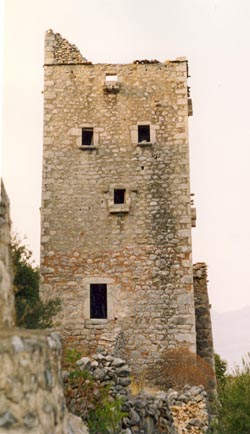 |
|
 |
|
|
Genealogical Searches in Mani By Donald-George McPhail, Translation and notes by Mary Papoutsy A Preface for |
 |
I read an article some time ago in the newspaper To Vima2 that on the Internet, in second place after pornography which is visited most often by "surfers," are those pages visited by persons searching for their genealogical beginnings. After the noted film "Roots" in which an African-American sought and located his roots somewhere in Africa (a true story), a new fad overtook our Greek society, to learn from where we hail.3 Abroad this fad has taken on the frenzy of an epidemic. Nevertheless, it is a craze with great interest that sometimes satisfies the research recipients and other times does not. There are many who discover that some ancestor, let's say a great-great-great-great-great-great-great-great-grandfather was a prince and others that their ancestor was a beggar. But from each point of view, the acquisition of a pedigree chart of an ancestral clan, apart from serving as a beautiful decoration on one wall of our homes--either in the home office or the living room, so that everyone can see it--it constitutes an historical and hereditary registration of our surname and our families. And as is well known, the family is a cornerstone of our society. These kinds of investigations in Greece are difficult, because expertise is required, as well as an endless expenditure of time upon a search through varied sources. We in this issue present two genealogical searches: one by our colleague Aris Poulimenakos4 on the Balteas family of Exo-Mani and the other by Eleni Panayiotarakou-Kargakou on a branch of the historical clan of Kyriakoulis Mavromihalis.5 We thank them warmly, as well as Nikolas Balteas who has permitted the publication of his genealogical tree. I think that it is the right time for us all to get a taste for the work involved and the value of genealogical research for each of us, and finally, for all of Mani. [signed] Donald-George McPhail 1A bimonthly Greek national publication featuring a wide range of informative and historical articles about this southern section of the province of Lakonia. For more information about Mr. McPhail or the magazine, read the brief HCS English description, or visit the publication's website. 2To Vima is one of the largest Greek national daily newspapers. 3This may seem strange to a person unfamiliar with Greek history and current demographics in Greece. Throughout the last century, especially in the early 1900s, the rural population of Greece declined significantly, while the Greek population in Athens and large cities abroad swelled commensurately. Nearly all Greek families now have branches based in Athens, as well as in the U.S., Canada, or Australia. The quest is not simply to learn about one's ancestors, but also to discover the whereabouts of one's collateral lines, relatives who may have long ago left for Egypt, Russia, Hungary, Canada, the U.S. and other countries. One sign of the growth of this interest is the appearance of a professional class of genealogists in Greece, investigators who conduct such research fulltime and earn a living doing so. It should not be forgotten that since ancient times Greeks have been explorers and seafarers, traveling to exotic locales in pursuit of prosperity; as a result, many Greek colonies were founded outside of Greece proper. Up until modern times these were prosperous Greek enclaves. But, for the unfortunate Greeks who chose to settle in eastern areas, places later brutally conquered and governed by Muslims, the record of their roots has been lost following centuries of genocides and pograms against Greek "Infidels" and foreigners. There were millions of Greek refugees from Anatolia and Pontus, particularly in the 1920s, from lands belonging to their ancestors for more than three thousand years, far predating the arrival of Turks. These displaced and traumatized refugees arrived penniless on the shores of Motherland Greece, never to see their homes again, losing the genealogical thread of their families shattered by the violence and upheaval. Read more about Greeks from Asia Minor in the HCS Smyrna Commemorative Series of the site's archives. 4HCS readers may wish to read our short article about Mr. Poulimenakos and his work. 5Only the article by Poulimenakos has been translated for HCS readers. |
|
|
|
